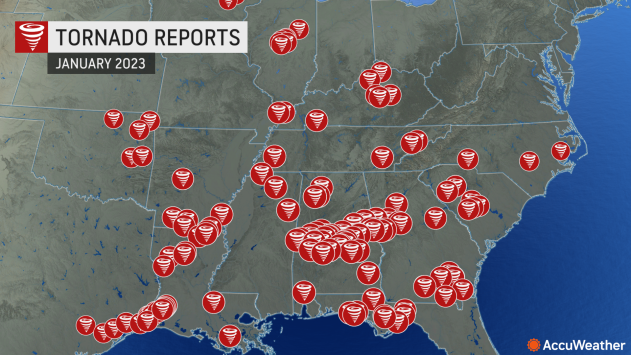More than 40 million at risk for severe weather from Texas to Ohio
Severe weather will erupt from the Gulf coast to the Great Lakes region through Thursday night, AccuWeather meteorologists warn. Not only will the severe weather occur unusually far to the north for this time of year, but it will also come with the dangers of nighttime thunderstorms capable of spawning a few tornadoes and other hazards.
A potent storm will harness the power of the jet stream and moisture from the Gulf of Mexico to trigger severe thunderstorms that will put more than 40 million people and property at risk.
On Thursday, the risk of severe thunderstorms will extend along an approximate 900-mile-long swath from the central Gulf coast to the shores of Lake Erie.
 |
"The magnitude of the severe weather, especially the storms in the Southern states, is not likely to be as intense as outbreaks have been earlier this winter," AccuWeather Chief On-Air Meteorologist Bernie Rayno said. However, even a brief tornado that touches down in a community can have devastating and deadly results.
Wind shear, or changing winds with altitude, will cause some of the thunderstorms to become severe and rotate. As this occurs, storms with powerful wind gusts, hail, torrential downpours and even a few tornadoes will develop. All of these modes of severe weather will continue into Thursday over the lower portion of the Mississippi Valley.
As the storms approach and swing through the major airport hubs of Cincinnati, Pittsburgh, Nashville and Atlanta, later Thursday to Thursday night, airline delays may mount. Ground stops are possible where planes may be held at the departure point until the all-clear has been sounded.
Overall, through Thursday night, the greatest threats from the storms will be damaging wind gusts and hail as well as torrential downpours that can suddenly reduce visibility for motorists and lead to flash flooding of streams and urban areas. The area at greatest risk for flash flooding will extend from near the Ohio River, southward to Tennessee.
 |
Wind gusts in the strongest storms will range between 60 and 70 mph with an AccuWeather Local StormMax™ of 80 mph possible.
In the zone predicted to experience severe weather from through Thursday night, strong winds are likely to knock over trees since the ground is moist and in some cases saturated from recent rounds of rain and storms. That is a factor that will threaten more power outages from storms even farther north across Ohio, southern Indiana, Kentucky and West Virginia.
The risk of severe thunderstorms will diminish on Friday as the cold front responsible for triggering the storms pushes from the Appalachians to the Atlantic coast. However, thunderstorms may extend along a broken line from as far north as Maine to as far south as the Florida Peninsula, or for about 1,300 miles.
 |
Thunderstorms in the Northeast states, especially from New York state through New England, are rare in February, due to the surrounding cold waters of the Atlantic Ocean and Great Lakes.
Some storms on Friday can pack brief, gusty winds and hard downpours, slowing highway travel and leading to airline delays at the major airport hubs from Boston and New York City to Charlotte and Orlando, as well as commuter flights at regional airports.
January 2023 brought a substantial number of severe weather incidents and tornadoes in the U.S. Of the 794 incidents of severe weather, there have been 168 preliminary reports of tornadoes, according to the Storm Prediction Center (SPC).
 |
Depending on continuing investigations, January will likely go down as the second busiest on record for tornadoes. January 1999 holds the top spot with 214 confirmed tornadoes, according to the National Oceanic and Atmospheric Administration (NOAA).
Water temperatures above the historical average in the Gulf of Mexico are one key factor that AccuWeather forecasters have pointed to in helping to fuel the frequent rounds of severe weather thus far this year.
Want next-level safety, ad-free? Unlock advanced, hyperlocal severe weather alerts when you subscribe to Premium+ on the AccuWeather app. AccuWeather Alerts™ are prompted by our expert meteorologists who monitor and analyze dangerous weather risks 24/7 to keep you and your family safer.






